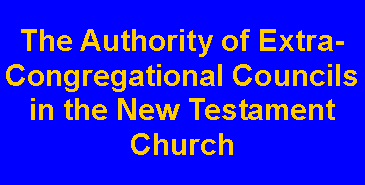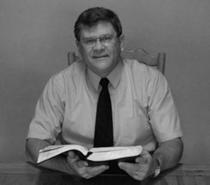|
In Barry L. Callen’s book, The Assembly Speaks, he opens with an article written by Leslie W. Ratzaff, “Functioning above Sectarianism.” The article was published in the June 30, 1985, issue of Vital Christianity. This is the Editor’s Note that precedes the article, “The following provides theological perspective on the nature of the local Christian congregations as traditionally perceived among church of God people. Congregations relate voluntarily to the reformation movement and to any agencies or assemblies formed to assist with the work of the church.”
The same article is concluded with this summary, “The church of God transcends any human alliance! Alliance separates from fellow Christians. Cooperation yes; formal alliances, no. The church of God is married to Christ alone and responds ultimately only to the Divine drumbeat. . . . The local church of God congregation, however, is under the sovereignty of God and is a divine-human organism answerable to God alone. Its relationship to the Church of God Reformation Movement is voluntary.”
Recorded in Acts 15, is a meeting, or convocation, of sorts that some have recently cited to challenge this view. This council was held to determine a doctrinal matter. Is this the pattern for a governing body holding power and authority to determine doctrines and creeds? Let's first examine the background of this meeting, Acts 15:1-6 NKJV:
"And certain men came down from Judea and taught the brethren, ‘Unless you are circumcised according to the custom of Moses, you cannot be saved.’ Therefore, when Paul and Barnabas had no small dissension and dispute with them, they determined that Paul and Barnabas and certain others of them should go up to Jerusalem, to the apostles and elders, about this question.
“So, being sent on their way by the church, they passed through Phoenicia and Samaria, describing the conversion of the Gentiles; and they caused great joy to all the brethren. And when they had come to Jerusalem, they were received by the church and the apostles and the elders; and they reported all things that God had done with them. “But some of the sect of the Pharisees who believed rose up, saying, ‘It is necessary to circumcise them, and to command them to keep the law of Moses.’ Now the apostles and elders came together to consider this matter."
The issue at stake: should the Gentile Christians be circumcised and keep the customs of the Old Testament?
We can learn at least two things from this passage: first, those attending this meeting were not representatives of many congregations who had come together to vote upon a creed. Those who met were the apostles, the elders of the Jerusalem church, Paul and Barnabas and representatives of specific congregations that had been troubled by men coming from the Jerusalem congregation. Paul and Barnabas had been made aware that false doctrine was coming from Jerusalem (vss. 4-6). Secondly, the purpose of this meeting was not to poll the church in general and vote upon a creed or belief, but it was to find God's will and teaching for one issue.
The apostles were representatives of God. The elders of the church of God in Jerusalem needed to be there, since it was their congregation that was at the heart of the trouble. Those present were recognized, Spirit-filled Christian leaders. That is not always true of modern human-led organizations. Therefore, we learn that this meeting cannot be universally applied to the church of all ages because of both its constituents and its purpose.
We read later in this chapter of Peter's account of God's miraculous approval of the Gentiles salvation (Cornelius’ household), the numerous reports of Paul and Barnabas working miracles among the Gentiles, and finally of James' citation of the prophecies which had foretold of the salvation of Gentiles. Based upon these miraculous, inspired, and scriptural arguments, the apostles and elders decided a letter should be circulated to stop the spread and influence of the false doctrine. From this letter and its circulation, we learn three more things that support the premise that extra-congregational councils hold no authority over local congregations. This prohibits using this event to teach the concept of multi-congregational government, Acts 15:22-32 NKJV.
"They wrote this letter by them ‘The apostles, the elders, and the brethren, To the brethren who are of the Gentiles in Antioch, Syria, and Cilicia: Greetings. Since we have heard that some who went out from us have troubled you with words, unsettling your souls, saying, ‘"You must be circumcised and keep the law"’—to whom we gave no such commandment—it seemed good to us, being assembled with one accord, to send chosen men to you with our beloved Barnabas and Paul, men who have risked their lives for the name of our Lord Jesus Christ.
“‘We have therefore sent Judas and Silas, who will also report the same things by word of mouth. For it seemed good to the Holy Spirit, and to us, to lay upon you no greater burden than these necessary things: that you abstain from things offered to idols, from blood, from things strangled, and from sexual immorality. If you keep yourselves from these, you will do well.’
"So when they were sent off, they came to Antioch; and when they had gathered the multitude together, they delivered the letter. When they had read it, they rejoiced over its encouragement. Now Judas and Silas, themselves being prophets also, exhorted and strengthened the brethren with many words."
First, the authority of this meeting was the apostles and prophets who represented God. Uninspired con-gregational representatives voting upon standards, policies, local church responsibilities, direction and doctrines for the church of God is in no way parallel to this meeting that was guided by inspiration of the Holy Spirit.
Second, the elders of the church at Jerusalem needed to be there since it was from their church that these false teachers went out spreading their doctrine. Apparently, the false teachers used the Jerusalem church as some kind of reference or support, since the letter specifically clarifies that the false teachers had taught such without endorsement (15:24).
Thirdly, it was the Holy Spirit who had inspired and endorsed the decision of this meeting. This is evidenced by the following phrase from verse 28, "For it seemed good to the Holy Spirit,” and it is further supported by the prophets who traveled with the letter for a personal endorsement (15:27).
I see no valid reason to believe that Acts 15 implies or substantiates in any way, that the New Testament church of God had headquarters in Jerusalem or that there were “official councils” that determined practices or doctrinal teachings binding on the church.
Each church of God congregation is to be autonomous, but that autonomy is subject to the law and love of Jesus Christ. Our relationship with Jesus binds congregations together in a spiritual bond that is longsuffering and supportive. The church is called to be united in a love relationship comparable to the Father and the Son. That will never happen with men, boards, or assemblies in control. “Cooperation yes, formal alliances, no.”
Certainly we need some structure, a means of coordinating our state and national efforts. We need to communicate with each other, facilitate that all are equipped with the best resource available, educate both the young and aged, but never should our structure endeavor to mandate what church of God congregations do; that responsibility belongs to Christ and Christ alone. Let’s take our hands off and see what Jesus can do with His bride.
I can live with that arrangement; for I am content to dwell in the church of God alone.
|


